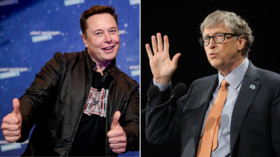What really grates with Bill Gates and his preachy new book is the assumption that a billionaire knows best about climate change
The billionaire former Microsoft boss-turned-global-philanthropist has a new book out, promoting a one-sided 'net zero' agenda – but at least he recognises how difficult the task is and concedes that, given he owns four private planes and lives in a 66,000 sq-ft mansion that boasts 24 bathrooms, he is “an imperfect messenger on climate change.”
How to Avoid a Climate Disaster is Bill Gates' attempt to stump up support for drastic action on reducing greenhouse gas emissions. He rightly suggests that a warming world is going to cause problems for humanity. He notes that comparatively small changes in average temperatures mean that things will look very different in the future. “In climate terms, a change of just a few degrees is a big deal,” he says. The last ice age was just six degrees cooler than today, he notes, and there were crocodiles in the Arctic Circle when dinosaurs last roamed the earth and the world was just four degrees warmer than today.
A warmer world, says Gates, would spell problems for coastal cities and low-lying countries, would leave many farmers with less water, increase the risk of unbearable temperatures causing heatstroke, lead to both increased drought and flooding, cause armed conflict and more refugee crises, and much more. (Many of these claims are actually far more controversial than he lets on.) Climate change, he argues, will kill far more people in the long run than Covid-19. That's true, but so will many other things, from heart disease and tuberculosis to malnutrition. Is it desirable to obsess about one particular problem?
As ever with the climate narrative, change is only ever seen as a downside. The potential plus sides of a warmer world are rarely mentioned, such as opening up new areas for agriculture in higher latitudes, for example. Cold weather is a bigger killer than hot weather. And, as a resident of Scotland, the possibility of warmer summers might make holidays 'at home' a lot more enjoyable.
There is also the question of how to deal with problems when they arise. Gates discusses the spread of tropical diseases like malaria to places “where they've never been seen before,” apparently unaware that malaria was endemic in Europe until near-eradication as recently as the 1950s. Malaria cases and deaths have fallen dramatically over the past decade or so, particularly in south-east Asia, suggesting that more economic development and better healthcare can have a huge impact. Would it not be better to tackle a problem like disease directly, in the hope of eradicating or greatly reducing it, rather than hoping that hugely expensive cuts in greenhouse gas emissions might avoid a proportion of cases in the future?
Still, if Gates’ book has merit, it is in drawing attention to how difficult it would be to slash greenhouse gas emissions. Building a few more wind farms, driving an electric car and scrupulously recycling your plastic bottles might seem like the right thing to do, but such changes really only scratch the surface.
Fossil fuels are absolutely central to our lives. They are a wonderful discovery, providing huge amounts of energy in a very compact form. Gates notes that, pound for pound, gasoline is 35 times more energy dense than the best lithium-ion batteries available today. Our emissions don't simply come from generating electricity (27 percent of emissions) and moving around (16 percent of emissions). Making things – particularly concrete and steel – produces 31 percent of emissions, but there are few alternatives to those materials right now.
Agriculture is another big source of emissions, and no amount of plant-based food and 'lab grown' meat can wipe those out entirely. Indeed, should we want them to? Animals turn things that are inedible to humans – particularly grass – into highly nutritious food. Looking out of my window in rural Scotland at the hills opposite, sheep and cows are producing food from a landscape where arable farming would be impossible.
Gates is right to point out that it would be impossible to get to 'net zero' emissions (that is, cut all the emissions we can and then capture greenhouse gases from the atmosphere to deal with the rest) without a huge investment in new technologies like safe, cheap nuclear power, alternatives to cement and much, much more. At least in that regard, he has much in common with other critics of climate-change policies like Bjorn Lomborg and Michael Shellenberger.
ALSO ON RT.COMBill Gates admits his ‘large carbon footprint’ makes him a ‘strange person’ to pressure others – as he plugs climate-change bookBut what really grates with Gates is the assumption that the worldview of a very rich man – even one who seems to be well-meaning – should inform public policy more than the democratic decisions of voters. The political classes, particularly in Western Europe, are of one mind that 'net zero' is a desirable goal, whatever the cost. That means we can't even have our say at the ballot box – there is no one critical of this agenda to vote for.
While Gates leans towards technical solutions and policy 'nudges' in the right direction from governments, the reality is that driving down emissions will require us plebs to do and have less: less driving, fewer flights, less meat, and so on.
Climate change and the 'great reset' is the outlook of middle-class politicians and Davos-attending billionaires, who sit around shaking their heads and tut-tutting at the dreadfully selfish consumption of ordinary people in developed countries before heading home to their mansions on their private jets.
This is not to say that there should be no effort to reduce greenhouse gas emissions. A world getting warmer more slowly would be a good thing, because adapting to change can be costly.
And there are some big gains to be made along the way. If electric cars can be made more convenient and affordable, they could greatly reduce air and noise pollution in cities. Electric cars are also easier to drive and maintain than petrol- and diesel-powered vehicles. Serious increases in funding for research and development could enable us to unleash new sources of power that are not only cleaner, but bountiful, too. 'Lab made' meat that could produce a delicious steak without all the hassle of rearing cattle is a great idea, in principle.
But at present, the focus on climate change not only always leads to the conclusion that we must do less, that the great bulk must be worse off, but it is also an opportunity cost. What if the smartest minds on the planet were laser-focused on raising the living standards of everyone on the planet? Couldn't we make even greater strides to improve the lot of humanity?
Many commentators believe that Gates and other Silicon Valley billionaires are on a mission to take over the world. I don't believe that there is such a huge conspiracy going on. But Gates, Jeff Bezos and the rest do have the money to throw around to influence the political agenda towards their own concerns, potentially leaving the rest of us worse off. The absence of a serious political debate about the merits of the goal of 'net zero' is the most troubling thing of all.
“I can’t deny being a rich guy with an opinion,” writes Gates, in an effort to explain away his lifestyle as being incompatible with his climate-change preaching. “It’s true that my carbon footprint is absurdly high.
“I own big houses and fly in private planes – in fact, I took one to Paris for the climate conference – so who am I to lecture anyone on the environment?” Indeed.
The statements, views and opinions expressed in this column are solely those of the author and do not necessarily represent those of RT.



0 Comments:
Post a Comment
Subscribe to Post Comments [Atom]
<< Home